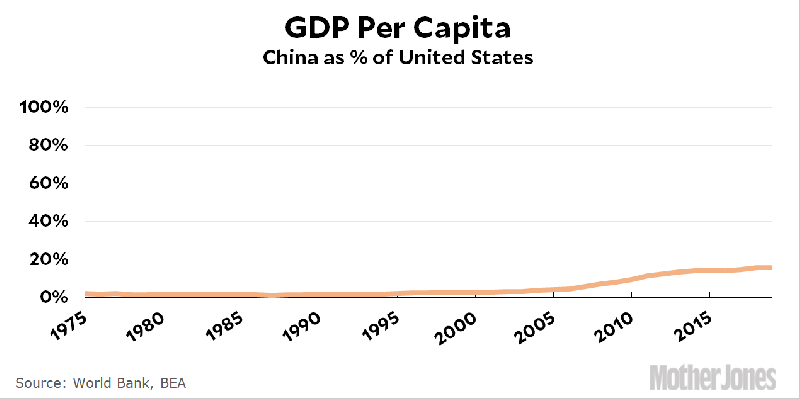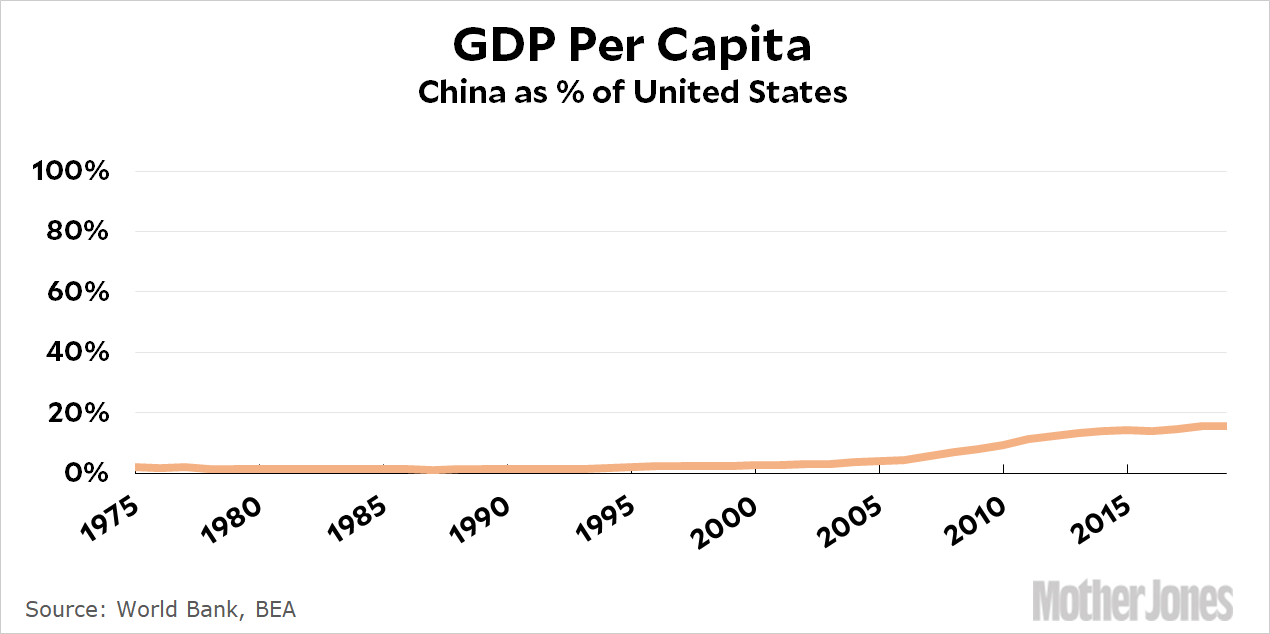China's Economy Is Still Light Years Behind the US



This is one of my pet peeves, so I beg your indulgence. This is from the Wall Street Journal today:
As the rest of the world struggles to contain the coronavirus, China's recovery is gaining momentum, positioning it to further close its gap with the U.S. economy….That bounceback, while far from China's heady expansions of past years, should nonetheless help the world's No. 2 economy move faster in catching up with the U.S., which could shrink by as much as 8.0% in 2020. It is also buttressing Beijing's belief that China's state-led model, which helped the country navigate the 2008-09 financial crisis with minimal pain, is better than the U.S.'s market system, emboldening Chinese leaders at a time of rising geopolitical competition with the U.S.
It's common practice to say that China's economy is #2 in the world, or perhaps even #1 depending on how you do your currency conversions. And it's true that China's GDP is about $15 trillion compared to America's $20 trillion. That's pretty close, and China is growing faster. Eventually they'll catch up.
But who cares? It's like bragging that California has more hospitals than Oregon. Of course it does. California has ten times as many people. In the case of China, what matters is GDP per person, and on that score China is light years behind the US. Here's the chart you knew was coming:

China's GDP per person is about $10,000, compared to $65,000 in the United States. They aren't even in the same ballpark, and it will be decades before they catch up to us—if they ever do.
There are obviously some legitimate reasons to look at overall GDP, but most of the time it seems to be little more than an attempt at drama. For some reason we're supposed to be afraid that China is going to take over the world, but that looks pretty ridiculous if you look at living standards and GDP per capita. So instead we're spoon fed total GDP, even though we almost never do that for any other country. Do you have any idea how Germany's GDP compares to ours? Or Spain's? Or Denmark's? Here's a hint: they're a lot lower because they have a fraction of our population.¹ Everyone knows it would be a ridiculous comparison, which is why you never see it.
But when it comes to China, we hear about it all the time. We should knock it off.
¹For the record, roughly $4 trillion, $1 trillion, and $0.3 trillion. Does this tell you anything interesting at all?





The cost to manufacture in China is going up. Corporations are already leaving for cheaper alternatives.
The one area I do see that China has an advantage on us is that their government has started down their path of a 10 year plan towards manufacturing the next generation of technology. That is where they have the advantage over the US. China has a big push towards renewable energy where our elected officials are still in bed with the fossil fuel industry.
Just a little additional information. GDP per capita does not show how income is distributed. China's GINI score is almost the same as the US. (A GINI of zero would mean that everyone in a country had exactly the same income - a good communist country. A GINI of one would indicate that only one person in the country had income and everyone else zero.)
For a good Communist country, they are starting to see quite an increase in income inequality .
China has a big problem just like everyone else with the baby boom generation, just multiplied as a percentage of their 1.4 billion population.
They also have the same problem of needing to automate manufacturing to remain competitive, but what do you do with those displaced workers?
As shown by Adam there are many ways to judge the monetary health of a country. GDP, GINI, COL. One of my favorites is the Forex reserves. The amount a country has in foreign monetary reserves.
Here are the 10 countries with the largest foreign currency reserve assets as of January 2020. All reserve assets are given in billions of U.S. dollars.
Rank
Country
Foreign Currency Reserves (in billions of U.S. dollars)
1
China
$3,399.9
2
Japan
$1,387.4
3
4
Russia
$562.3
5
$501.8
6
$479.1*
7
Hong Kong
$475.6
8
India
$473.3
9
$409.7
10
Brazil
$359.4
Maintaining foreign currency reserves is vital to the economic health of a nation. The top 10 nations in terms of foreign currency reserves had combined reserve assets of $8.9 trillion as of January 2020, more than 40% of which was accounted for by China and Hong Kong.
As you can see China is number one with over $3 trillion dollars in foreign reserves. The US is rated 20th.
Just another way of looking at the financial situation of a country.
I thought that this was an interesting figure.
Well even if the total economy of China was actually equal to ours, they have 4.5x as many people to spread it around to. The bigger issue for us is their ability to create a defense force and space exploration program equal to ours because those areas don’t have to be pro rated per capita.
Basing standard of living by way of GDP does not capture what truly is occurring. In the U.S. we pay a lot more for many products than would be paid in China. Generally speaking, the average Chinese standard of living would be about 60% of the average American.In 2010, the average Chinese was about 20% of the average American. The average American standard of living has fallen about 15% during that period.
This is horseshit.
The wealth and power of a nation are its GDP. Not its GDP per capita.
China's GDP passed America's five years ago.
Very true Bob..... Especially in a country that holds that people are expendable.
It's not true the US GDP is larger than Chinas.
The USA GDP is larger than Chinas.
When adjusted for purchasing power parity (needed to really compare apples to apples) the US falls to second behind China. This is outlined in your link Dean.